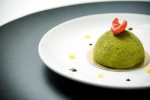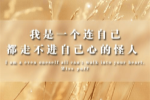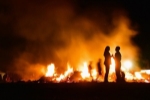
五单元英语同步练习册作文【一】
1. Nancy is too young to dress herself.
Nancy is not _____ _____ to dress herself.
2. My watch doesn't work well.
There is ____ _____ _______ my watch.
3. Jane doesn't go to work by bus any longer.
Jane ____ _____ _____ to work by bus.
4. It took Mary two weeks to prepare for the exam.
Mary _____two weeks____ ______ for the exam.
5. It seems that they have known each other.
They seem to _____ _____ each other.
6. "My grandpa doesn't like coffee or coke" said Bob
Bob said that _____grandpa liked _____coffee _____coke.
7. Cao Fei joined the League three years ago.
Cao Fei _____ ____ _____ the League for three years.
8. I prefer walking there to going by bus.
I prefer to walk there ____ _____ going by bus.
9. -Thank you very much. -You're welcome.
- ____ a lot. -Not at____ .
10. Kitty does well in English.
Kitty ____ ____ ____ English.
11. They realized Hainan was a beautiful place after they reached there.
They____ realize Hainan was a beautiful place_____ they reached there.
12. We will have to finish the work hardly if you don't help us. We can't finish the work _____ _____ ______
13. My dictionary isn't so thick as yours.
My dictionary is _____ than yours.
14. Could you tell me where the East Street Hospital is? Excuse me, ____ is the _____ to the East Street Hospital?
15. The book is exciting to read.
It is ____ _____ read the book.
16. Jack's mother asked him, "Have you packed your things?" Jack's mother asked him ____ he ____ packed his things.
17. She likes singing better than dancing. She ____ singing ____ dancing.
18. Remember to ring me up as soon as you get to Nanjing Make ____ to give me a ring as soon as you _____ Nanjing.
19. They couldn't catch the train because of the heavy traffic. The heital?
15. The book is exciting to read.
It is ____ _____ read the book.
16. Jack's mother asked him, "Have you packed your things?" Jack's mother asked him ____ he ____ packed his things.
17. She likes singing better than dancing. She ____ singing ____ dancing.
18. Remember to ring me up as soon as you get to Nanjing Make ____ to give me a ring as soon as you _____ Nanjing.
19. They couldn't catch the train because of the heavy traffic. The heavy traffic _____ them from _____ the train.
20. My brother has been away from home for two days.
My brother _____ home two days _____ .
21. Li Lei decided to move to Canada when he was thirty.
Li Lei made a _____ to move to Canada at the _____ of thirty.
22. Jim was too careless to pass the exam last term.
Jim was not_____ _____ to pass the exam last term.
23. If you don't hurry up, you can't catch the train.
Hurry up, _____ you may _____ the train.
24. Yang Li wei said to us, "I'm going to visit your school tomorrow. " We were all pleased.
We were all pleased when we heard Yang Li wei_____ visit_____ school the next day.
25. This is the most interesting film I have ever seen. I have ____seen _____ an interesting film before.
26. I was late for school because of the traffic accident. The traffic accident _____ me _____ getting to school on time.
五单元英语同步练习册作文【二】
今天,是春天的季节,爸爸开着汽车到了奶奶家,看了看那里的景色,简直像一片绿色的海洋,稻田里有许多好吃的菜,弯弯的黄瓜已经到天上当月亮了,白菜已经减肥了,不比南瓜胖了,但它刚起来的头发很乱,青辣椒生病了,整个身体都是青色的,花菜是个爆炸头,没人和它交朋友,可是在人们的眼里,花菜是最好吃的……
我看着菜就想吃了,可是还没煮吧,忽然我看见远处有一个绿色头发的'小姑娘,我赶紧往那里跑去,一看,原来是一棵碧绿色的柳树站在那儿,可我怎么看都是一个姑娘,因为她的辫子让我感到很迷人,再看看下面的木头,一圈圈的年迈,像衣服似的花纹。
高山上,长着很多很多的嫩草,绿树不知有多少,“等闲识得东风面,万紫千红总是春”好啊!
这就是我的家乡风景,美丽极了,青菜遍地,柳树长成了一个活泼机灵的绿色小姑娘,高山一个比一个高,蓝蓝的天空照在绿色的海洋之中,多么像一幅正在舞动的画啊!
一幅美丽的画面已经显示完了,你们的家乡有多美丽?来说说吧!
五单元英语同步练习册作文【三】
我们河北邢台过去被称为百泉之城,因为它遍地是泉。最集中的是西南郊百泉村一带,泉眼密布,河道纵横,土地全部自流灌溉,盛产水稻、鱼虾和芦苇,宛如江南水乡。城北的'达活泉公园,更是以其清冽的泉水和旖旎的风光吸引着游人。但是70年代以后,邢台的泉逐渐干涸,众多的河渠变成了干土沟,昔日的水稻田现在生长的是玉米、小麦,以泉水著称的达活泉公园也只能靠自来水维持它那浅浅的人工湖了。
原因──过量开采地下水。
五单元英语同步练习册作文【四】
楼兰,曾是中国一座著名的古城,许多古代诗文都提到过它,王昌龄还留下了黄沙百战穿金甲,不破楼兰终不还的名句。唐朝时,这里还是一个十分富饶的地方,它靠近罗布泊,周围水草丰茂,牛羊成群,又处在丝绸之路上,是东西方客商往来的必经之地。
可是现在,楼兰却早已被沙漠吞噬。居民迁走了,牛羊不见了,罗布泊干涸了(50年代还有水),丝绸之路中断了,只有那断壁残垣还留在沙漠中,偶尔有一支考察队来到这里,凭着废墟想像它昔日的风采。
五单元英语同步练习册作文【五】
虐上面的是虎头,也是虎字的变形;下面的是一只反着的,即爪的变形,古文字写作、。虐字用老虎反爪抓人表示残暴之义。
总结:学习确定中心句,结合课文教学进行听说训,增强环境生态方面的危机感,培养环保意识。
五单元英语同步练习册作文【六】
??年级数学上册面积换算与改写同步练习1,12.5公顷=(平方米78000平方米=(公顷
2,680平方厘米=(平方分米0.75平方米=(平方分米
3,270平方厘米=(平方分米1.4公顷=(平方米
4,4.5平方米=(平方分米2400平方厘米=(平方分米
5,3平方米=(平方分米4800平方厘米=(平方分米
6,4.08m2=(dm26200平方米=(公顷
7,90平方厘米=( 平方米4.3公顷=( 平方米
8,5平方米8平方分米=( 平方米=( 平方分米
9,108平方米=( 平方分米 9千米=(米=(分米
10,2.25平方米=( 平方厘米0.05时=(分
11,180平方厘米=( 平方分米 800千克=(吨
12,375厘米=( 分米600平方米=(公顷
13,2.6平方分米=( 平方厘米 400平方分米=(平方米
14,5.7公顷=( 平方米
15,3020平方厘米=(平方分米
16,0.45公顷=(平方米680平方厘米=(平方分米
17,5.34平方米=(平方米(平方分米=(平方分米
18,9平方分米50平方厘米=(平方分米
五单元英语同步练习册作文【七】
(一)改写一般疑问句:
(1)原句中有be动词的,将be动词提前,其他顺序不变。
例如:Thisisacat.变为Isthisacat?
(2)原句中有情态动词的(can/may/shall/would)将情态动词提前,其他顺序不变。例如:Hewouldlikeapie.变为Wouldhelikeapie?
(3)原句中是一般动词的,在句首加助动词do或dose(用于主语是第三人称动词单数的句子),其他顺序不变。例如:Iplaytheguitar.变为Doyouplaytheguitar.
(4)原句中的some变any。
注:以情态动词开头的一般疑问句,并且要求对方做肯定回答的`some不变。
(5)原句中的第一人称改为第二人称。例如:Iamanurse.变为Areyouanurse?
(6)以dose开头的一般疑问句,原来动词的第三人称单数形式要变回原形。例如:Hereadsastorybook.变为Dosehereadastorybook?
(二)改写否定句:
(1)原句中有be动词的,直接在be动词后面加not。例如:Itisadog.→It’snotadog./Itisn’tadog.
(2)原句中有情态动词的,直接在情态动词后加not。
例如:Iwouldlikeahotdog.→Iwouldnotlikeahotdog.
(3)原句中是一般动词的,在一般动词前加don’t或doesn’t(用于主语是第三人称单数的句子),doesn’t后面用原型。例如:Iseethreehamburgers.→Idon’tseethreehamburgers.
原句中的some变any例如:Ihavesomebreadan
dmilk.→Idon’thaveanybreadandmilk.
(4)以let开头的祈使句,如果是letus或letme,直接在其后加not;如果let后面其他人称代词宾格(you、him、her、them、it)就在let后面加助动词don’t。例如:Letusgotothepark.→Letusnotgotothepark.再如:Letthemdohomework.→Don’tletthemdohomework.
(三)对划线部分提问:
对划线部分提问,就是先把一个陈述句的划线部分去掉,然后变为一个特殊疑问句:一是特殊疑问句+一般疑问句;
二是特殊疑问句+陈述句(对主语或主语的定语提问,therebe结构除外)
⑴划线部分是人,用who提问。
⑴划线部分是主语,用who提问,who后面的动词要用第三人称单数形式。如:Whois;Wholikes;Whohas?
方法:who+原句的剩余部分
例如:①HelenandMikearelisteningtomusic.
→Whoislisteningtomusic?
②Ihavesomemodelplanes.
→Whohasanymodelplanes?
⑵划线部分是表语,用who提问。
方法:Who+剩余部分的一般疑问句形式
⑵划线部分是事或者物,用what提问。
方法:what+剩余部分的一般疑问句形式。
注:如果原句是therebe句型,直接用What’s+地点状语来提问。例如:①Wewouldliketobuysomethingsforaparty.
→Whatwouldyouliketobuyforaparty?
②Therearealotofcakesintheplate.
→Whatisintheplate?
⑶划线部分是物主代词或名词所有格,用Whose提问。
方法:⑴划线部分是主语的定语时,Whose+剩余部分
例如:Ourclassroomisbright.
→Whoseclassroomisbright?
⑵划线部分是表语或表语的定语时,Whose+剩余部分的一般疑问句形式例如:①ThewomanisSuYang’steacher.
→Whoseteacheristhewoman?
注:对某部分的定语提问,被修饰的部分跟随特殊疑问句往前提②ThispurseisYangLing’s.
→Whosepurseisthis?
⑷划线部分是地点,用where提问。
方法:where+剩余部分的一般疑问句形式
例如:TheyarehamingaMathslessonintheclassroom..
→WherearetheyhavingaMathslesson?
⑸划线部分是“多少”,用howmany或howmuch提问。
方法:⑴句中是可数名词的用Howmany+剩余部分的一般疑问句形式例如:Therearefifteentreesintheplayground.
→Howmanytreesarethereintheplayground?
⑵句中是不可数名词的用Howmuch+剩余部分的一般疑问句形式例如:Ihaveaglassofjuiceforbreakfast.
→Howmuchjuicedoyouhaveforbreakfast?
⑹划线部分是时间,用when或whattime(具体的几时几分)提问。方法:⑴when+剩余部分的一般疑问句形式
例如:SuYangandSuHaiareathomeonSundaymorning.
→WhenareSuYangandSuHaiathome?
⑵问具体的时间直接用Whattimeisit?或What’sthetime?问
例如:It’sthreeforty-five.
→Whattimeisit?或What’sthetime?











